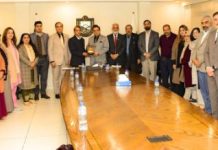ISLAMABAD, JUL 27: /DNA/ – Pakistan Industrial and Traders Associations Front (PIAF) has strongly demanded that the government formally acknowledge the consistent and growing contribution of the trade and business community to national tax revenues, stressing that traders are unfairly burdened while their input is often misrepresented or overlooked.
In a joint statement issued today, PIAF Chairman Faheem-ur-Rehman Saigol, Senior Vice Chairman Nasrullah Mughal, and Vice Chairman Tahir Masood Chaudhary criticized the long-standing and rigid taxation framework that continues to place a disproportionate load on a few segments of the economy, particularly traders and the manufacturing sector, while failing to ensure equity across all sectors.
“Traders have long been contributing to the national exchequer through various taxes—be it advance income tax, withholding tax, or returns filed—yet they continue to face mistrust, harassment, and lack of recognition,” said Chairman Faheem-ur-Rehman Saigol. “Instead of appreciation, there is always suspicion and confusing statements that distort the truth about what the business community is actually paying.”
The PIAF leadership emphasized that Pakistan’s current tax system is in dire need of reform based on fairness, clarity, and facilitation. They said the outdated structure disproportionately relies on the formal and semi-formal segments, while large parts of the informal economy remain untaxed. The system is not only complex but also lacks transparency in reporting actual contributions made by various sectors—especially the trade and wholesale community.
Senior Vice Chairman Nasrullah Mughal said that tax authorities frequently issue broad and inconsistent statements about retail sector tax contributions, while the underlying numbers include substantial payments made by wholesalers, traders, and importers, unfairly clubbed under the retail heading without distinction.
He said, “The recent claims of massive income tax from the retail sector are misleading if the actual contributors—traders and wholesalers—are not accurately separated. Traders have paid hundreds of billions of rupees, but lumping their taxes into vague definitions does nothing but hide their real input and create confusion.”
According to data shared in public forums, the total income tax collection from this broadly defined “retail” sector crossed Rs600 billion, including over Rs300 billion in advance taxes paid quarterly by traders and wholesalers. In addition, billions were collected via withholding taxes on sales, imports, electricity bills, and other heads—all of which were mainly paid by trading businesses, not conventional retailers.
Vice Chairman Tahir Masood Chaudhar added, “This blurred classification not only damages the reputation of the trader community but also discourages tax compliance. If those who are paying honestly are still ignored or wrongly represented, what incentive remains for further documentation?”
PIAF called on the government and the Federal Board of Revenue (FBR) to review and restructure their approach. The association proposed a separate, clear recognition of traders’ contribution in all official statements and data, coupled with a fresh strategy to widen the tax base without overburdening existing payers.
The leadership also emphasized the need for consultation-based reforms. Any structural changes in the tax system must involve direct input from business representatives to ensure policies are both implementable and equitable.
PIAF reiterated its full support for digitization, documentation, and transparency in taxation, but warned that selective interpretation of numbers and vague definitions erode trust. The association reaffirmed its commitment to cooperate with the government in building a modern, inclusive, and respectful taxation environment, but stressed that recognition and fairness are essential starting points for any successful reform.

















